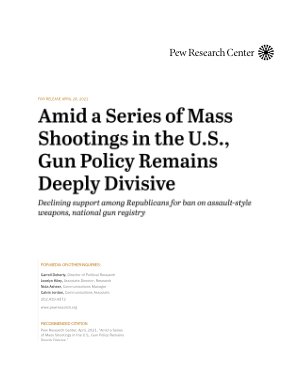By Pew Research Center
In an era marked by deep divisions between Republicans and Democrats, few issues are as politically polarizing as gun policy. While a few specific policy proposals continue to garner bipartisan support, the partisan divisions on other proposals – and even on whether gun violence is a serious national problem – have grown wider over the last few years.
Today, just over half of Americans (53%) say gun laws should be stricter than they currently are, a view held by 81% of Democrats and Democratic-leaning independents but just 20% of Republicans and Republican leaners. Similarly, while nearly three-quarters of Democrats (73%) say making it harder to legally obtain guns would lead to fewer mass shootings, only 20% of Republicans say this, with most (65%) saying this would have no effect.
The new national survey by Pew Research Center, conducted from April 5-11, 2021 among 5,109 adults, finds that 73% of Democrats consider gun violence to be a very big problem for the country today, compared with just 18% of Republicans who say the same. The current partisan gap on this question is 11-percentage-points wider than in 2018 and 19 points wider than in 2016.
Washington, DC: Pew Research Center, 2021. 29p.





